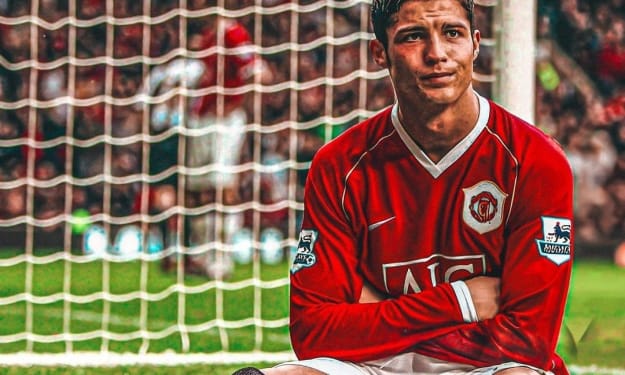From Cuju to Blockchain and AI
Football and Technology

Football⚽️: The Origin
Historians suggest that the history of football (soccer) dates back as far as 2500 B.C. During that time, the Chinese (Cuju), the Japanese (Kemari), the Greeks (Episkyros) and the Romans (Harpastum) all appear to have partaken in games involving a ball and feet. With the Chinese game of Cuju - meaning “kicking the ball” that might have been a training exercise for soldiers - being the most relevant of these ancient games to our modern day football.
Fast forward, somewhere around the 9th century, entire towns in England would kick a pig’s bladder from one landmark to another and the game will often become extremely violent. By the 1800s, dedicated football clubs at schools began to emerge. On October 26, 1863, representatives of several football clubs met in London for the inaugural meeting of "The Football Association" (FA).
That was the begging of football as we know it today and the word soccer was derived from an abbreviation from the word “association” in FA. Shortly after in 1904, the International Football Federation (FIFA) was inaugurated.
Industrial Revolutions and Football
The first two Industrial Revolutions (from mid-18th century until the early 20th century) marked a major turning point throughout human history.
In particular, as a result of the switch from artisans and craftsmen to factories and machines, the standards of living for the general population begun to significantly increase for the first time in history. And it would appear now that the modern football established itself just in the right moment of history, probably to fill in the gap left behind by the continuous decline of poverty, violence and the endless wars of the past.
Thus, the warriors of the Trojan War and of Qin Shi Huang’s army, the gladiators of the Colosseum and the mercenaries of the Crusades - exemplary and flawless biological machines of the past, that once protected us sometimes “entertained” us and inspired our myths and imagination - were somehow “mutated” in the 1900s and transformed into more peafull personalities, namely the football players with their huge armies of happy and passionated fans following them everywhere.
At around the same time, all that personalities of warriors, soldiers, explorers and pioneers of the past that did not join the industry of football, followed the path of the multinational corporations and investment companies. As a consequence, our world since then has continued to improve and has modernised in every aspect. But most importantly, the violence, the barbarism and the nationalism of the past have been "translated" into milder forms of expression of our primitive human instincts through mass sports, and modern economic and cyber warfares. Let's see why.
The entire evolutionary process of the human species has been promoted by the use of tools. Tools have essentially helped us to survive not only through their functional use cases but also by becoming the intermediaries that have absorbed the violent behaviors included in our genes (in fact, kicking a ball is better than kicking someone in the face...).
In particular, from the stones, shields, arrows, arcs and tanks, to the economic and cyber wars and ball games of our times, everything is indicating that we are moving towards a new path where violence between humans is constantly being distanced from the (fragile) human body by being transferred into another arena, and in particular nowadays it is uploaded and digitised.
In other words, we now spend our time trolling on Facebook, we are digital hooligans, we are cyber warriors and we play virtual economic wars but at the end of the day without scratches and wounds we are having a beer.
That is to say, our history from a macroscopic point of view is teaching us that technology and tools (and a ball) have been assisting us in order to survive and evolve by protecting us also from our own wild instincts. Everything else in that process, from a microscopic point of view, belongs to the realms of economics and politics.
But let’s see how the 4th Industrial Revolution is going to affect football.
Digital Transformation and the Football
In this new normal of digital transformation, everything we ever thought we knew about success will be challenged and the football is not an exception. But surprisingly the digital transformation is not going to have a disruption-effect for the business of football clubs, but rather an enhancement-effect. To put it another way, digital technology has arrived only to upgrade the industry of football.
Football clubs have one very significant attribute, which clearly distinguishes them from other industries: "Their Loyal Armies of Fans". And by leveraging this extraordinary relationship of loyalty between clubs and fans, the clubs have a unique opportunity to gather information on each and every fan.
Fans leave significant tons of data as they pass by: what they like to eat, where they want to sit in the stadium and what video clips they enjoys watching. Therefore, wearable technologies and matched fans' data will offer new business models, will create more fan engagement and will expand digital marketing strategies that football clubs and players will exploit.
So, as long as the financial health of clubs is basically secure, their oligopolistic control of the game is unlikely to be disrupted by any advances in technology. (Source: FOOTBALL’S DIGITAL TRANSFORMATION by pwc)
And this brings us to the problem, an approximate 80% of clubs worldwide are in financial difficulties and in huge debt due to wrong doings and mismanagement. Moreover, with the limitations brought upon the industry due to the COVID-19 pandemic, the clubs had to find new strategies to ensure clubs and fans remain connected in a socially distanced world.
Therefore, the sports industry has finally recognised that the blockchain technology is capable of revolutionising the club-fan experience through increased crypto-sponsorships, fan tokens, non-fungible tokens (“NFTs”) or even by entrance of blockchain providers into the market (Source: The Future of Sports - Cryptocurrencies and Blockchain Technology).
For example, in 2018 the Arsenal Football Club has reached an agreement with the gaming company CashBet, to promote the launch of CashBet Coin, a cryptocurrency specifically designed for use on CashBet’s online gambling platforms to bet on matches. CashBet is a Californian iGaming enterprise SaaS platform providing custom solutions for mobile, social, peer-to-peer and skill-based gaming.
Paris Saint-Germain and Juventus became the first two major football clubs to partner with Socios.com the world’s first scalable, tokenised voting platform where football fans can buy, trade and execute voting or ‘crowd-manager’ rights for their favorite football teams. In particular, the Juventus Official Fan Token will connect fans worldwide and enable fans to participate in some of the club’s decisions, using mobile voting and polling platforms. This, in turn, creates a strong bond between Juventus and its supporters.
By September 2020, eToro - the world's leading social trading platform, which offers both investing in stocks and cryptocurrencies - became one of Europe’s biggest football sponsors of clubs such as Tottenham Hotspur FC, Brighton & Hove Albion FC, Cardiff City FC, Crystal Palace FC, Leicester City FC, Newcastle United FC and Southampton FC. eToro suggests that cryptocurrency can be used to authenticate merchandise, reduce ticket touting and for player transfers.
In the end, through blockchain and cryptocurrencies, it is becoming easier for fans and clubs to interact and exchange value with each other in an efficient way, enabling fans to participate in the decisions of their favorite teams. But also AI and data collection are important.
As a matter of fact, in recent years the amount of data available in football has swelled with the use of sensors, GPS trackers and computer vision algorithms that track the movement of both players and ball, with AI offering a way to spot patterns that coaches can’t.
For this reason this year, the Alphabet-owned company DeepMind decided to work with Liverpool to apply AI to transform the football. For example, by training a model with data from a specific team and lineup (Liverpool provided DeepMind with data on every Premier League game the club played between 2017 and 2019), they can predict how its players will react in a particular situation or how an opponent might play if a key player goes off injured. (Source)
Finally, the Israeli startup PlayerMaker now headquartered in the UK has an innovative wearable sensor that players affix to the outside ankle of each cleat with a silicon strap. The sensor collects and analyses technical and physical metrics for individual players and can map out tactical data such as spacing and passing networks (Source).
In the end, digital will “democratise” the football industry, with easier access to information and communication. Proliferation of smart devices and the increased role played by tech-savvy executives will foster wider adoption of digital-analysis tools improving the efficiency of the football industry.
Thank you for reading 💙
And if you liked this post why not share it?
PS:
Here you can find "The Most Famous Soccer Quotes of All Time", and my favourite quote is:
"Success is no accident. It is hard work, perseverance, learning, studying, sacrifice and most of all, love of what you are doing or learning to do." – Pele






Comments
There are no comments for this story
Be the first to respond and start the conversation.